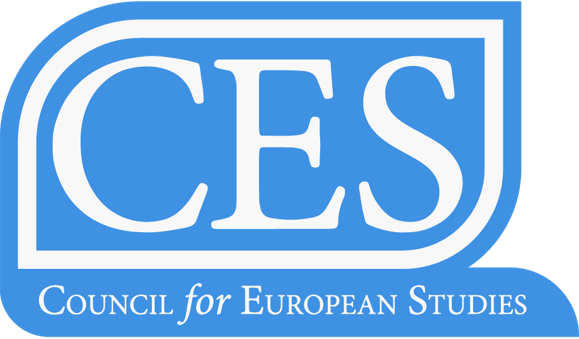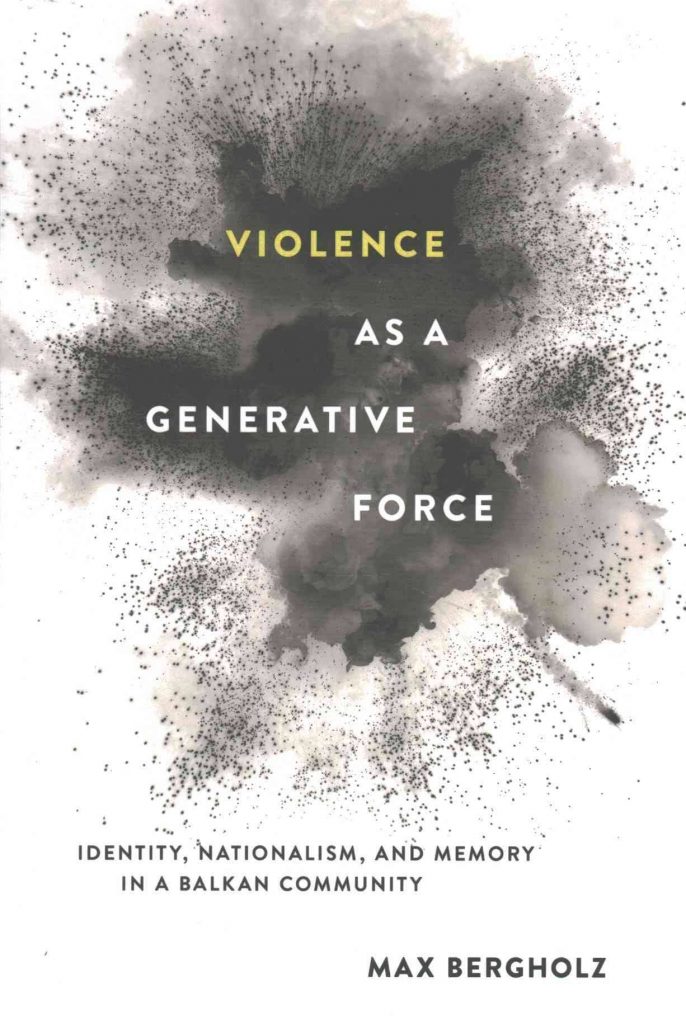
The Council for European Studies’ (CES) Book Award Committee is pleased to announce the winner of the 2018 European Studies Book Award.
Max Bergholz (Concordia University) has received the 2018 European Studies Book Award for his book Violence as a Generative Force: Identity, Nationalism, and Memory in a Balkan Community.
During two terrifying days and nights in early September 1941, the lives of nearly two thousand men, women, and children were taken savagely by their neighbors in Kulen Vakuf, a small rural community straddling today’s border between northwest Bosnia and Croatia. This frenzy—in which victims were butchered with farm tools, drowned in rivers, and thrown into deep vertical caves—was the culmination of a chain of local massacres that began earlier in the summer. In Violence as a Generative Force, Max Bergholz tells the story of the sudden and perplexing descent of this once peaceful multiethnic community into extreme violence. This deeply researched microhistory provides provocative insights to questions of global significance: What causes intercommunal violence? How does such violence between neighbors affect their identities and relations?
Contrary to a widely held view that sees nationalism leading to violence, Bergholz reveals how the upheavals wrought by local killing actually created dramatically new perceptions of ethnicity—of oneself, supposed “brothers,” and those perceived as “others.” As a consequence, the violence forged new communities, new forms and configurations of power, and new practices of nationalism. The history of this community was marked by an unexpected explosion of locally executed violence by the few, which functioned as a generative force in transforming the identities, relations, and lives of the many. The story of this largely unknown Balkan community in 1941 provides a powerful means through which to rethink fundamental assumptions about the interrelationships among ethnicity, nationalism, and violence, both during World War II and more broadly throughout the world.
Max Bergholz is Associate Professor of History at Concordia University in Montreal, where he has taught since 2011. His interests include microhistorical approaches to the history of modern Europe, with a particular focus on the local dynamics of nationalism, intercommunal violence, and historical memory. His fieldwork focuses on Bosnia-Herzegovina, Croatia, and Serbia. In 2016, Cornell University Press published his first book, Violence as a Generative Force: Identity, Nationalism, and Memory in a Balkan Community, which has won four prizes.
2018 European Studies Book Award – Honorable Mentions
The Book Award Committee has awarded Honorable Mention to Noah Benezra Strote of North Carolina State University for his book Lions and Lambs: Conflict in Weimar and the Creation of Post-Nazi Germany, and to Erik R. Scott of the University of Kansas for his book, Familiar Strangers: The Georgian Diaspora and the Evolution of Soviet Empire.
Lions and Lambs: Conflict in Weimar and the Creation of Post-Nazi Germany by Noah Benezra Strote (Yale University Press)
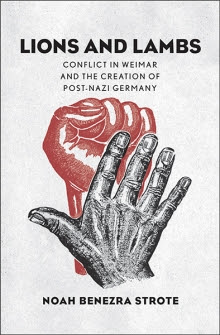
Not long after the horrors of World War II and the Holocaust, Germans rebuilt their shattered country and emerged as one of the leading nations of the Western liberal world. In his debut work, Noah Strote analyzes this remarkable turnaround and challenges the widely held perception that the Western Allies—particularly the United States—were responsible for Germany’s transformation. Instead, Strote draws from never-before-seen material to show how common opposition to Adolf Hitler united the fractious groups that had once vied for supremacy under the Weimar Republic, Germany’s first democracy (1918-1933). His character-driven narrative follows ten Germans of rival worldviews who experienced the breakdown of Weimar society, lived under the Nazi dictatorship, and together assumed founding roles in the democratic reconstruction.
While many have imagined postwar Germany as the product of foreign-led democratization, this study highlights the crucial role of indigenous ideas and institutions that stretched back decades before Hitler. Foregrounding the resolution of key conflicts that crippled the country’s first democracy, Strote presents a new model for understanding the origins of today’s Federal Republic.
Noah Benezra Strote is Associate Professor of European history at North Carolina State University. He earned his PhD in History from the University of California, Berkeley in 2011, and has also studied at Columbia University in the City of New York and the Humboldt University of Berlin. He is a former fellow at the Center for Advanced Holocaust Studies of the United States Holocaust Memorial Museum in Washington, D.C.
Familiar Strangers: The Georgian Diaspora and the Evolution of Soviet Empire by Erik R. Scott (Oxford University Press)
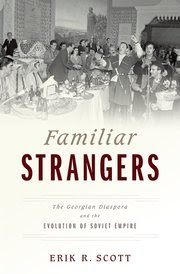
A small, non-Slavic nation located far from the Soviet capital, Georgia was more closely linked with the Ottoman and Persian empires than with Russia for most of its history. One of over one hundred officially classified Soviet nationalities, Georgians represented less than 2% of the Soviet population, yet they constituted an extraordinarily successful and powerful minority. Familiar Strangers aims to explain how Georgians gained widespread prominence in the Soviet Union, yet remained a distinctive national community.
Through the history of a remarkably successful group of ethnic outsiders at the heart of Soviet empire, Erik R. Scott reinterprets the course of modern Russian and Soviet history. Scott contests the portrayal of the Soviet Union as a Russian-led empire composed of separate national republics and instead argues that it was an empire of diasporas, forged through the mixing of a diverse array of nationalities behind external Soviet borders. Internal diasporas from the Soviet republics migrated throughout the socialist empire, leaving their mark on its politics, culture, and economics. Arguably the most prominent diasporic group, Georgians were the revolutionaries who accompanied Stalin in his rise to power and helped build the socialist state; culinary specialists who contributed dishes and rituals that defined Soviet dining habits; cultural entrepreneurs who perfected a flamboyant repertoire that spoke for a multiethnic society on stage and screen; traders who thrived in the Soviet Union’s burgeoning informal economy; and intellectuals who ultimately called into question the legitimacy of Soviet power.
Looking at the rise and fall of the Soviet Union from a Georgian perspective, Familiar Strangers offers a new way of thinking about the experience of minorities in multiethnic states, with implications far beyond the imperial borders of Russia and Eurasia.
Erik R. Scott is an Associate Professor of Russian History and the Director of Graduate Studies for the Center for Global and International Studies at the University of Kansas. Drawing on years of fieldwork and knowledge of several regional languages, his research and teaching explore migration and diaspora within and beyond the imperial borders of Russia and the Soviet Union. Professor Scott has been awarded grants from the American Council of Learned Societies, the American Philosophical Society, Fulbright-Hays, and the National Endowment for the Humanities, among others. He teaches undergraduate and graduate courses on Russian and Soviet history, the Cold War, comparative empires, and global migration. He received his PhD from the University of California, Berkeley.
European Studies Book Award Shortlist
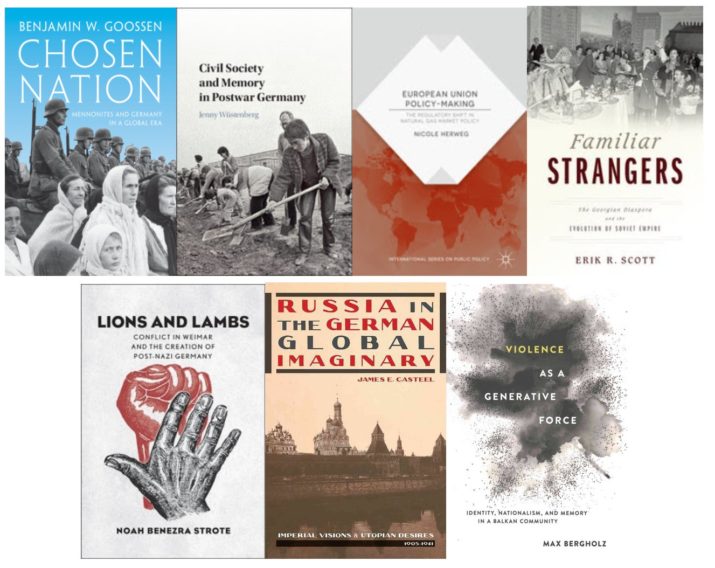
Chosen Nation: Mennonites and Germany in a Global Era by Benjamin W. Goossen (Princeton University Press);
Civil Society and Memory in Postwar Germany by Jenny Wüstenberg (Cambridge University Press);
European Union Policy-Making. The Regulatory Shift in Natural Gas Market Policy by Nicole Herweg (Springer/Palgrave Macmillan);
Familiar Strangers: The Georgian Diaspora and the Evolution of Soviet Empire by Erik R. Scott (Oxford University Press);
Lions and Lambs: Conflict in Weimar and the Creation of Post-Nazi Germany by Noah Benezra Strote (Yale University Press);
Russia in the German Global Imaginary: Imperial Visions & Utopian Desires 1905-1941 by James E. Casteel (University of Pittsburgh Press);
Violence as a Generative Force: Identity, Nationalism, and Memory in a Balkan Communityby Max Bergholz (Cornell University Press).
